Hegseth reverses ‘social justice/Biden initiative’ supported by key Trump officials

Defense Secretary Pete Hegseth made waves on Tuesday when he proudly announced the end of the Women, Peace and Security (WPS) program at the Pentagon. In a post on X, Hegseth criticized the program as a woke, divisive, social justice initiative that distracted from the core task of war-fighting. He referred to WPS as a United Nations program pushed by feminists and left-wing activists, with politicians fawning over it while troops reportedly hated it.
Hegseth stated that the Department of Defense would comply with the minimum requirements of the program as dictated by law, but would lobby to fully end it in the next budget cycle. He expressed his satisfaction with the decision by adding, “GOOD RIDDANCE WPS!”
The Women, Peace and Security program had been implemented across various departments in 2019, under the Trump administration. President Trump himself had signed the WPS Act into law in 2017 and released a WPS strategy in 2019. The strategy recognized the important role women play in preventing and resolving conflicts, countering terrorism, and building post-conflict peace and stability.
However, Hegseth’s decision to end the program raised eyebrows, as many other members of Trump’s administration had supported the WPS initiatives. Former Homeland Security Secretary Kristi Noem and Secretary of State Marco Rubio were among the key figures who had been involved in the development and promotion of the program.
In a follow-up post on X, Hegseth clarified that he meant the Biden administration had “ruined” the WPS program, which was originally launched in 2017 as a security-focused initiative. He criticized the current administration for distorting and weaponizing the program, calling it a “woke divisive/social justice/Biden initiative.”
The original WPS strategy aimed to increase women’s meaningful leadership in political and civic life, empower them to lead and contribute, and provide them with the necessary skills and support to succeed. It highlighted the importance of women’s participation in conflict prevention and resolution, as well as post-conflict peacebuilding and recovery efforts.
Despite Hegseth’s decision to end the program, the White House’s stance on the matter remains unclear. Hegseth pledged to work towards undoing the WPS program, which had guided plans at the Defense, State, and Homeland Security departments, as well as USAID.
The Women, Peace and Security Act, which originated from a United Nations Security Council Resolution in 2000, was the first comprehensive law passed in any country to focus on protecting women and promoting their participation in society. President Trump had proudly promoted the program on his campaign website, highlighting it as one of his accomplishments.
In conclusion, while Hegseth’s decision to end the Women, Peace and Security program may have sparked controversy, the original intention of promoting women’s participation in conflict resolution and peacebuilding remains an important goal. It is essential to consider the impact of such programs on global security and stability, and to ensure that women’s voices are heard and valued in these critical efforts.




